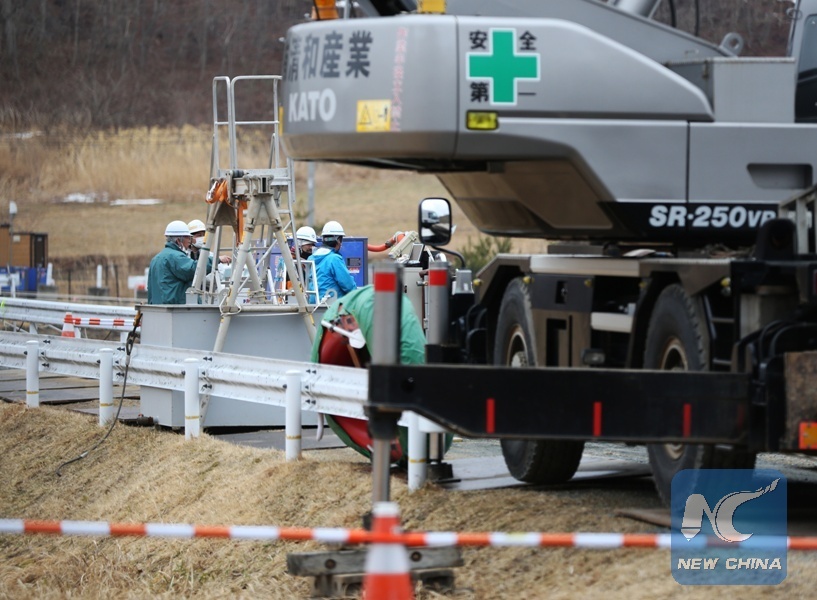
Workers are seen behind large equipment in the town of Iitate, Fukushima Prefecture, Japan, March 7, 2015. (Xinhua/Liu Tian)
TOKYO, March 17 (Xinhua)-- "Such scams are a shame to Japan," said a reporter from Tokyo Metropolitan Television Broadcasting Corp., referring to a recently-exposed scandal involving labor dispatch agencies duping foreign refugees into doing decontamination work in Fukushima.
Various local media have exposed recently that some Japanese companies have swindled foreign refugees into doing decontamination work in Fukushima with empty promises that such work might help extend their visas to stay in Japan.
Fifty-year-old Hosein Moni and 42-year-old Hosein Deroaru from Bangladesh were both caught in such a scam, according to a recent report by the Chunichi Shimbun, one of the largest newspapers in Japan.
The two came to Japan in 2013 seeking to be recognized as political refugees. In Japan, foreigners are given temporary permission to stay for up to six months at one application before they are recognized as refugees and given status as residents.
According to government data, the number of refugees actually afforded recognition as refugees in Japan is disproportionately low among developed nations, while the numbers of those applying for refugee status has been rapidly increasing in recent years in Japan.
The government received some 5,000 such applications in 2014, but only 11 were granted refugee status, according to the data.
Moni and Deroaru were told by a so-called labor dispatch agency in Nagoya that they could do decontamination work in exchange for an extension of their visa.
The two, knowing little Japanese and trying to seize every opportunity they could, accepted the job and worked in Fukushima for three months in 2015.
But when they finished their work and went to the local immigration bureau to extend their stay, they were told by officers there that they knew nothing about such a policy.
They later found out that the construction company that had hired them had changed its company name, and its Fukushima branch had closed.
Half of the 20 workers that they had worked with in Fukushima were foreigners, many of whom had been applying for refugee status in Japan, the pair later recalled.
Their work mainly involved clearing away contaminated soil with spades, and while they were at work might well have been affected by high levels of radiation. "The radiation detectors we brought with us kept sounding alarms, which was rather scary," they were quoted as saying.
The incident, after been exposed by local media, also caused a splash on social network sites. Many Japanese netizens felt indignant that such scams were happening in their homeland.
"Earthquake, nuclear plant, poverty... there are always some people trying to cheat or hurt other people here just for money," remarked Kojima on Twitter.
"Why has my home country degenerated to such a low place," said "Hootoo," another netizen here.
They also called on the Japanese government to strengthen regulations on the Japanese companies to prevent such scams from happening.
Japan's immigration bureau, for its part, said that the incident was with "vile nature", and it would conduct investigations soon.
In fact, however, for a long time, due to lack of manpower, many of Japan's "three-K" (kiken, kitanai, kitsui, which means dangerous, dirty and tiring) jobs have been done by foreign immigrants, as the Japanese are reluctant to do such work.
"As Japanese people don't want to do the work, it has to be done by foreigners," said Ishikawa, a Brazil-born Japanese who was in charge of coordinating foreign workers in decommissioning work linked to the Fukushima Daiichi Nuclear Plant, according to a report published by the Mainichi Shimbun last year.
Most of the foreign workers could hardly speak Japanese. As anti-radiation brochures provided by the plant's operator, Tokyo Electric Power Company Holdings Inc. (TEPCO), were only available in Japanese or English, many of the workers could not understand it, Ishikawa was quoted as saying.
The foreign workers, to some extent, saved the contractors and TEPCO by pushing forward the decommissioning work of the nuclear plant, remarked the report.
A magnitude-9.0 earthquake in 2011 triggered a massive tsunami which destroyed the emergency power and then the cooling system of the Fukushima Daiichi nuclear power plant, and caused a serious nuclear disaster, forcing some 300,000 people to evacuate.
The operator of the crippled Fukushima Daiichi nuclear plant, has said it plans to decommission the crippled reactors in about four decades.
However, the difficult tasks such as processing contaminated water, cooling the reactors and removing nuclear fuel and debris, continue to pose serious challenges to the power company as well as the government.

